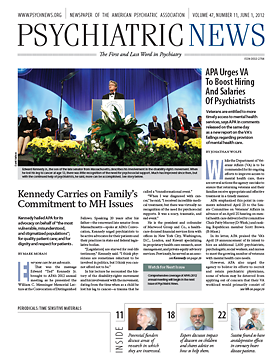Individuals who experienced mental illness within the preceding year were more likely than those who did not to also suffer from chronic physical health conditions.
This finding comes from an analysis of data collected through the National Survey on Drug Use and Health (NSDUH) and published April 5 in the NSDUH Report, which is issued by the Substance Abuse and Mental Health Services Administration (SAMHSA).
Among the information provided by adult participants in SAMHSA’s annual survey is past-year experience of any mental illness (AMI), serious mental illness (SMI), and/or a major depressive episode (MDE). For the purposes of the survey, AMI is defined as “having a diagnosable mental, behavioral, or emotional disorder … of sufficient duration to meet diagnostic criteria specified within [DSM-IV].”
SMI is defined as having AMI with “serious functional impairment that substantially interferes with one or more major life activities.”
SAMHSA defines an individual as having had an MDE if he or she had at least five of nine symptoms listed in DSM-IV in the same two-week period in his or her lifetime, in which at least one of the symptoms was a depressed mood or loss of interest or pleasure in daily activities.
Based on combined 2008 and 2009 NSDUH data, SAMHSA estimated that 44.5 million Americans aged 18 or older, or 19.7 percent of the adult population, had AMI in the preceding year. Of these, approximately 10.4 million adults (4.6 percent of the population) had a past-year SMI, and approximately 14.5 million adults (6.5 percent) had an MDE within the prior 12 months.
In assessing the presence of co-occurring physical health conditions in those affected by mental illness, SAMHSA reported that adults experiencing AMI or an MDE in the prior year were more likely than those without these illnesses to have high blood pressure, asthma, diabetes, heart disease, or stroke.
And individuals with past-year SMI were more likely than those without SMI to have high blood pressure, asthma, or stroke.
The survey data also showed greater health care utilization for individuals with mental illness than for those without. The survey results indicated, for example, that 38.8 percent of adults with AMI used emergency-room services in the prior year, compared with 27.1 percent of adults without mental illness. Additionally, 15.1 percent of adults with past-year AMI required hospitalization, compared with 10.1 percent of the general population.
Similarly, those with past-year SMI and/or an MDE were significantly more likely than those without these illnesses to visit the emergency room or to be hospitalized.
SAMHSA concluded in its report that these findings strongly suggest a greater need to screen for and treat “physical” conditions in those with mental illness and to screen for and treat mental disorders in patients with other kinds of medical illness. As a result, the agency also urged implementation of programs that better integrate mental health care and primary care services.

